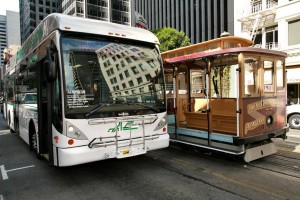
Buses may yet prove to be the most innovative way to travel.
UTC Power said one of its PureMotion System Model 120 fuel-cell power plants, which are installed in its hybrid electric transit buses on the streets of Stamford, recently surpassed 10,000 operating hours in real-world service with its original cell stacks and no replacement. The overachieving powerplant is aboard an Alameda-Contra Costa Transit District bus operating in Oakland, CA.
Dana Kaplinski, manager of Hartford-based UTC Power”™s transportation business, said the technology the company introduced in 2007 has surpassed transportation leaders”™ expectations.
“Buses equipped with the Model 120 fuel-cell system have traveled more than 630,000 miles,” said Kaplinski. “That is a significant benchmark as we continue to make progress toward the commercialization of fuel-cell buses.”
UTC Power is part of United Technologies Corp.
Buses powered by the PureMotion system are proving to be twice as fuel efficient as diesel-powered buses and generate no soot or smog-forming pollutants, according to Kaplinski. She said that every bus equipped with the system reduces nitrogen-oxide emissions equivalent to removing 77 cars from the road a year.
There are currently 18 transit buses in commercial service powered by the PureMotion system. Five of the 18 operate in the CTTransit line, which covers Stamford, and the Greater Hartford, New Haven, Waterbury, New Britain, Meriden, Bristol and Wallingford areas. The other 13 buses are in service in Oakland, CA.
“We have seen remarkable progress in power plant durability,” said Steve Warren, assistant general manager of maintenance services for CTTransit. “We operate the newest fleet of four fuel-cell buses in the same urban conditions and routes as our diesel fleet, from snowstorms to the recent heat wave, and their performance has been outstanding.”
Warren said after four years the Model 120 power plants have consistently maintained 90 percent average availability while operating in commercial transit service, meaning the units are operational and available to power the buses on scheduled runs 90 percent of the time.
“This reliability surpasses transit industry target high marks of 85 percent availability for conventional engines,” said Kaplinski.
UTC”™s fuel cells have also been installed on transportation fleets in Spain, Italy and Belgium.
Last October CTTransit added four of the new buses to its Hartford location. To accommodate its growing fuel-cell fleet, CTTransit is building a garage to store up to six buses and is installing a hydrogen fueling station at its headquarters.


















